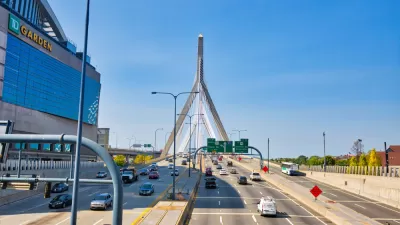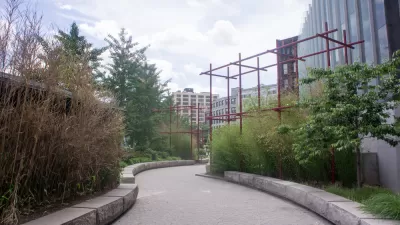Ten years after the completion of the Central Artery and Tunnel project—or the Big Dig, as it's more commonly known—has the project become more justifiable?
Anthony Flint takes a look back at the Big Dig—that infamous, long-delayed, well-over-budget project that created the most expensive highway in U.S. history.
After Flint spends a few paragraphs writing in a style close to prose poetry to describe the development process for the Central Artery and Tunnel project, we arrive to the present day—ten years after the official completion of the project. "How are we feeling now?" Flint asks. "Maybe there’s room for some grudging appreciation."
The feature length article provides background on the political and planning processes that lead up to the project before focusing on the outcomes of the project. On that latter point, Flint reports a mixed bag regarding the congestion relief pitched as a primary benefit of the project: "Looking at the new roadway system by itself, the Central Artery and Tunnel project is solving that problem [of congestion], with capacity to spare." Yet also, "[t]he theory of induced demand…has played out as predicted, particularly at the Ted Williams Tunnel, where traffic typically stacks up every evening trying to get to East Boston, Logan, and points north."
Flint also uses the perspective offered by the passage of town to analyze some of the design and execution of the project. One line sums up the analyses well: "for every triumph, there were gaffes." The article also includes evaluations about the potential transit investments that could have been funded with some of the project's $15 billion price tag as well as some of the project's benefits to the city's landscape, urban design, and development market. Flint concludes by considering whether the project could have been conceived and completed any other way.
FULL STORY: 10 years later, did the Big Dig deliver?

Maui's Vacation Rental Debate Turns Ugly
Verbal attacks, misinformation campaigns and fistfights plague a high-stakes debate to convert thousands of vacation rentals into long-term housing.

Planetizen Federal Action Tracker
A weekly monitor of how Trump’s orders and actions are impacting planners and planning in America.

In Urban Planning, AI Prompting Could be the New Design Thinking
Creativity has long been key to great urban design. What if we see AI as our new creative partner?

Florida Seniors Face Rising Homelessness Risk
High housing costs are pushing more seniors, many of them on a fixed income, into homelessness.

Massachusetts Budget Helps Close MBTA Budget Gap
The budget signed by Gov. Maura Healey includes $470 million in MBTA funding for the next fiscal year.

Milwaukee Launches Vision Zero Plan
Seven years after the city signed its Complete Streets Policy, the city is doubling down on its efforts to eliminate traffic deaths.
Urban Design for Planners 1: Software Tools
This six-course series explores essential urban design concepts using open source software and equips planners with the tools they need to participate fully in the urban design process.
Planning for Universal Design
Learn the tools for implementing Universal Design in planning regulations.
Gallatin County Department of Planning & Community Development
Heyer Gruel & Associates PA
JM Goldson LLC
City of Camden Redevelopment Agency
City of Astoria
Transportation Research & Education Center (TREC) at Portland State University
Jefferson Parish Government
Camden Redevelopment Agency
City of Claremont




























